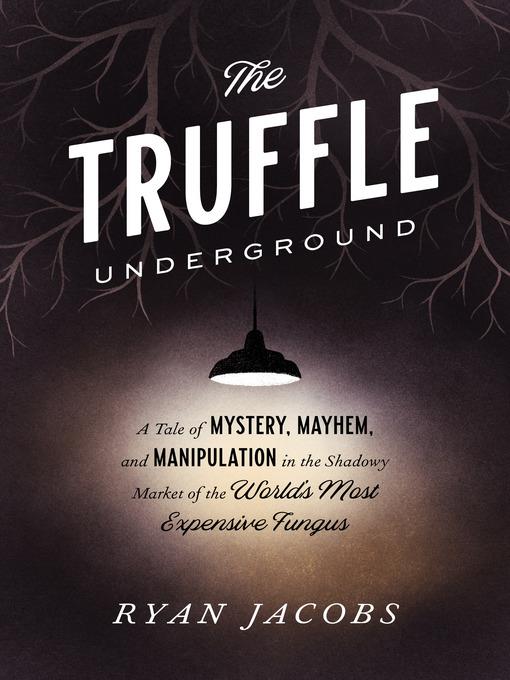
The Truffle Underground
A Tale of Mystery, Mayhem, and Manipulation in the Shadowy Market of the World's Most Expensive Fungus
کتاب های مرتبط
- اطلاعات
- نقد و بررسی
- دیدگاه کاربران
نقد و بررسی

February 25, 2019
Investigative reporter Jacobs, who writes for the Atlantic, digs deeply into the international truffle business in this fascinating work. Truffles are “revered as one of the finest, scarcest, and most valuable ingredients in fine dining,” Jacobs writes. Traveling to France and Italy, where the most sought-after varieties grow, he found an under-regulated business of foragers and shady middlemen who sold the prized fungi to restaurants and distributors. Jacobs also uncovered a dangerous world of criminals who poison or steal other hunters’ prized truffle sniffing dogs, and a French farmer willing to shoot and kill to protect the truffles that grow on his property. Jacobs interviews truffle experts such as American octogenarian Jim Trappe, a scientist who spent his life studying “mycorrhizae, the types of fungus that form in symbiosis with the roots of trees.” The book culminates a case of corporate fraud in 2003 in a California court, against the world’s biggest truffle company, Urbani U.S.A., which sold cans of Chinese truffles intentionally mislabeled as black truffles. This deeply researched and eye-opening account of the lengths people will go for wealth, gratification, and a taste of the prized fungus will captivate readers.

May 1, 2019
A rare fungus inspires rapture, deceit, and stealth. In an entertaining, revealing book debut, Pacific Standard deputy editor Jacobs brings his considerable skills as an investigative reporter to the fiercely competitive business of marketing truffles. Coveted by chefs and wealthy diners, truffles inspire rhapsodic descriptions of their earthy aroma and taste. "There's something about them that is very primal," one chef notes. "They get your attention at a very deep emotional level." Tasting a white truffle, Jacobs reports, proved so intense that he felt transported, "momentarily, into an alternate universe, a place where flavor mattered more than truth and virtue." Of the hundreds of truffle species, only a handful are edible, and of these, only two generate passionate "culinary fervor": the rare, pale white truffle, "the culinary holy grail," and black winter truffles, "the crown jewels," which sell for an astonishing 500 to 1,000 euros per kilo. The truffles' rarity and scarcity are the result of a complicated botanical process: Truffles' spores emit a musk that attracts forest animals, which ingest them and release them as defecation on the forest floor. The spore cluster then needs to find a particular tree root in order to germinate, a process that can take decades; when it burrows into the root's outer cells, a symbiotic relationship between tree and fungus begins, and through several seasons, if temperature and moisture are optimal, the truffle produces its edible fruit. Truffle hunters rely on specially trained dogs to sniff out their buried quarry, dogs that are vulnerable to stealing or poisoning by competitors. Truffles can be farmed as well as hunted, but competition is just as furious and "suspicion and paranoia" just as pervasive. France and Italy produce the most coveted truffles; some experts look for "the specific aroma that the Italian terroir imparts," but other traders are not so particular, knowing that they can sell inferior truffles from Morocco, Tunisia, China, and Romania, passing them off as higher quality to buyers who desire "the appearance of wealth." A deftly crafted tale of obsessions and true crime in the culinary world.
COPYRIGHT(2019) Kirkus Reviews, ALL RIGHTS RESERVED.

July 1, 2019
In this new book, Jacobs, a reporter with The Atlantic and Mother Jones, starts with a tip from a mushroom forager that leads him around the world in search of truffles and their purveyors. He follows truffles from field to forest to market to plate and even stops in a laboratory to understand the unusual characteristics of this fungus. Along the way he meets a variety of interesting characters and experiences the unique culture that surrounds this fungus. Jacobs, in his travels, even encounters the criminality and deception that comes with a rare commodity that is highly sought after. His prose starts carefree, but becomes more sober as he learns how secretive, as well as lucrative, the truffle market has become. In the end, he finds himself coming to terms with the current market, seeing both good and ill continuing to shape the business. VERDICT Jacobs brings the reader on a fascinating journey that will be enjoyed both by foodies and by travel lovers.--Ginny Wolter, Toledo Lucas Cty. P.L.
Copyright 2019 Library Journal, LLC Used with permission.

Starred review from March 1, 2019
Anyone who's savored the unrivaled sensual pleasure of a fresh truffle can appreciate why this subterranean fungus awakens an irresistible lust for more and more. Worldwide demand for these elusive mushrooms has pushed prices to stratospheric levels, and where such sums are involved, criminal markets follow. Investigative journalist and first-time author Jacobs does a remarkable job reporting from the front lines of the truffle industry, bringing to vivid life French black-truffle farmers, Italian white-truffle foragers, and their marvelously well-trained dogs. Both humans and canines suffer from thieves who sneak into oak groves and mountain lairs not only to pilfer their truffle crops, but also stooping to poison or steal their beloved dogs as well. Although black-truffle cultivation began in the nineteenth century, worldwide demand still far outstrips supply. And then there are the truffle merchants, some dealing in counterfeit or adulterated fungi. Foodies will learn perhaps too much here?they might never again be able to simply relish a truffle, naive of its power to unleash mayhem and murder?but they'll certainly enjoy doing so.(Reprinted with permission of Booklist, copyright 2019, American Library Association.)

























دیدگاه کاربران